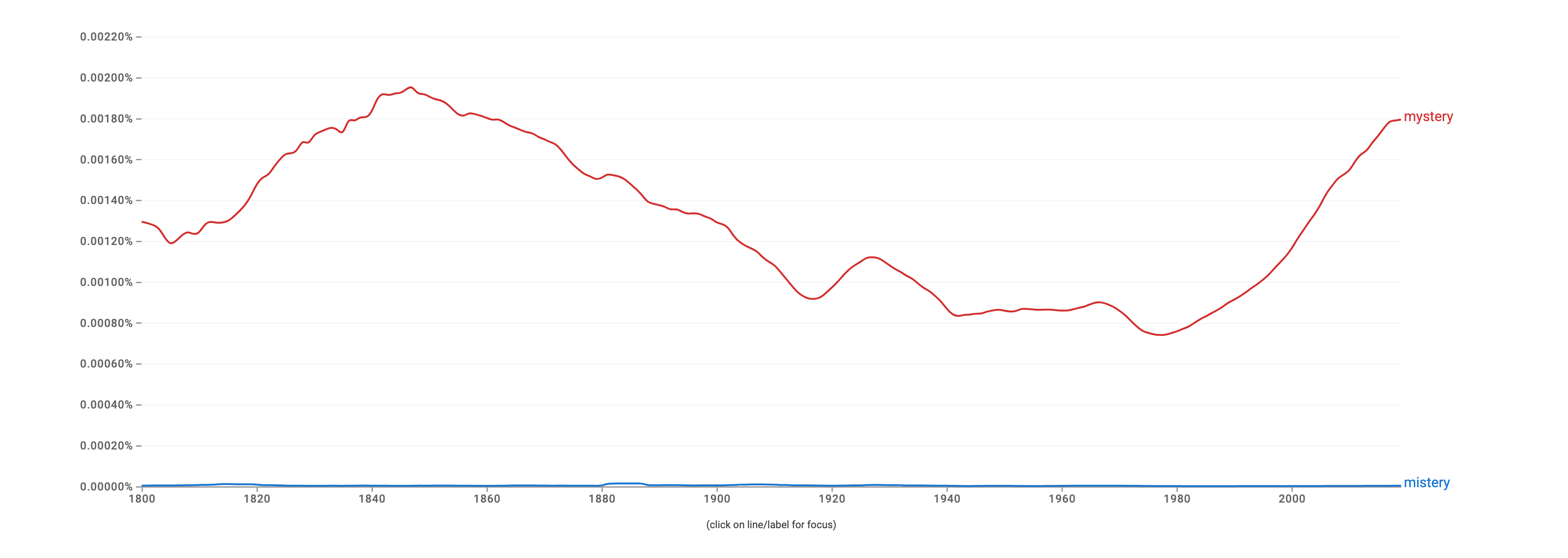- "Mistery" is the incorrect spelling of "mystery."
- A "mystery" is an enigmatic or perplexing situation or event that eludes understanding or explanation, often sparking curiosity and prompting investigation.
✅ As the old book creaked open, revealing its yellowed pages, the reader was drawn into a world of suspense and intrigue, eager to unravel the mystery that lay within its captivating narrative.
❌ As the old book creaked open, revealing its yellowed pages, the reader was drawn into a world of suspense and intrigue, eager to unravel the mistery that lay within its captivating narrative.
In this sentence, the term "mystery" refers to an unknown or puzzling element within the narrative of the old book, creating a sense of suspense and intrigue that captivates the reader's curiosity. The reader is eager to uncover and understand the undisclosed aspects or secrets concealed within the storyline.
Mystery
Part of Speech: Noun
Plural: mysteries
Definitions:
Something that is unknown, hidden, or unexplainable:
- The origin of the pyramids remains a mystery.
- The scientist was baffled by the mysterious substance in the vial.
- Life itself is a grand mystery.
Something that arouses curiosity or suspense due to its being obscure, secret, or enigmatic:
- The masked figure whispered cryptic messages, adding to the mystery of the night.
- Her motives were shrouded in mystery, leaving everyone wondering why she did it.
- The author was known for crafting novels full of intriguing mysteries.
A story (usually fictional) that centers around a puzzling event, typically a crime, which is eventually solved:
- I love curling up with a good mystery novel on a rainy day.
- The detective meticulously pieced together the clues, slowly unraveling the mystery.
- Whodunit mysteries challenge readers to solve the crime alongside the protagonist.
(Historical) A secret religious rite or doctrine, especially those of ancient Greece and Rome:
- The Eleusinian Mysteries were celebrated annually in honor of Demeter and Persephone.
- Only initiates were privy to the true meaning of the mysteries.

"Mystery" is used much more than "mistery." The use of the word "mystery" has also increased since the 1980s.

How do we pronounce mystery?
In American English, "mystery" is pronounced mi·str·ee.
In British English, "mystery" is pronounced mi·str·ee.
These are just the standard pronunciations, and there may be slight variations depending on regional accents and individual speech patterns.
🖊️ Baffles Meaning and Examples
🖊️ Currious vs. Curious: Which is Correct?
Why does the misspelling of mystery as mistery occur?
The misspelling of "mystery" as "mistery" can occur for several reasons:
1. Phonetic misspelling: Some people might try to spell the word based on its pronunciation, which can be particularly tricky in English with its many silent letters. The "y" in "mystery" is silent, so someone unfamiliar with the correct spelling might hear it as "mistery" and write it down accordingly.
2. Analogy with other words: Words like "history" and "mystery" share the same "-tery" suffix. This could lead to the "y" in mystery to be substituted for a "i."
3. Typographical errors: Simple typos and keyboard mistakes can also contribute to the misspelling. Accidental double keystrokes or hitting the wrong key nearby can easily result in "mistery" instead of "mystery."
Common misspellings of mystery may include:
- mystary
- mistry
- mystrey
- mysterey
Example sentences for the misuse of the word mystery as mistery
- It's important to note that "mistery" is an incorrect spelling; the correct term is "mystery" when referring to unknown or puzzling situations.
- Avoid confusion by using the correct spelling—"mystery"—instead of the common misspelling "mistery" when describing enigmatic or suspenseful elements.
- If you come across the term "mistery," remember that it's a misspelling; the accurate spelling for captivating unknowns is "mystery."
- In literature discussions, be cautious not to use "mistery" as it is an incorrect variation; the appropriate term is "mystery" for conveying mysterious and intriguing scenarios."
- Correct your spelling: it's "mystery," not "mistery." The latter is a common mistake, and using the accurate spelling is essential for clear communication.
Example sentences for mystery
- The detective embarked on a relentless pursuit of clues to unravel the mystery surrounding the inexplicable disappearance of the renowned scientist.
- As the ancient map was unfolded, an air of excitement filled the room, promising an adventure full of twists and turns, unveiling the mystery of a hidden treasure.
- In the eerie moonlit forest, strange sounds echoed, adding to the mystery of the abandoned mansion that stood shrouded in secrets and forgotten tales.
- The cryptic message left by the anonymous sender sparked a citywide quest as residents joined forces to solve the mystery behind the enigmatic notes.
- A mysterious figure emerged from the shadows, leaving behind a trail of unanswered questions that only intensified the intrigue surrounding the unsolved case.
Synonyms of mystery
- Enigma
- Puzzle
- Riddle
- Conundrum
- Puzzle
- Secret
- Puzzle
- Uncertainty
- Intrigue
- Anomaly

Want to sound like a native speaker?
Engram’s AI-powered grammar checker makes your English sound like a native speaker’s, suggesting natural English expressions on top of fixing grammar, spelling, punctuation, word order, and vocabulary.

References:














